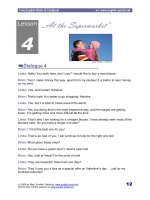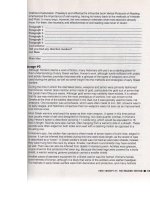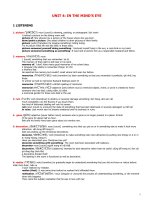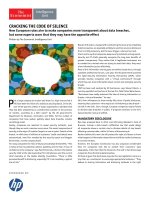4 4 4 cracking the german code
Bạn đang xem bản rút gọn của tài liệu. Xem và tải ngay bản đầy đủ của tài liệu tại đây (4.3 MB, 14 trang )
Suggested levels for Guided Reading, DRA,™
Lexile,® and Reading Recovery™ are provided
in the Pearson Scott Foresman Leveling Guide.
Cracking the
German Code
by Rena Korb
Genre
Expository
nonfiction
Comprehension
Skills and Strategy
• Graphic Sources
• Main Idea and
Details
• Ask Questions
Text Features
•
•
•
•
Heads
Charts
Captions
Glossary
Scott Foresman Reading Street 4.4.4
ISBN 0-328-13467-8
ì<(sk$m)=bdegha< +^-Ä-U-Ä-U
Reader
Response
Cracking
the
German Code
1. Reread the information in the text feature on
page 19 and look at the examples. What would
the coded lettering for wetter be?
2. What questions did you ask yourself as you were
reading this book? Using a chart similar to the
below,
by one
Rena
Korb write at least two of your questions in
the left column and the answers in the right.
Questions
Answers
3. The Greek word kryptos means “hidden.” The
English suffix –graphy in cryptography means “the
process of recording, writing, or drawing.” Think
about the work of the people at Bletchley Park.
What does the word cryptography mean?
4. Nonfiction books use captions and labels to help
you learn more about photographs, illustrations,
and the topic. What is something you learned
from the captions in this book?
Editorial Offices: Glenview, Illinois • Parsippany, New Jersey • New York, New York
Sales Offices: Needham, Massachusetts • Duluth, Georgia • Glenview, Illinois
Coppell, Texas • Ontario, California • Mesa, Arizona
World War II
Every effort has been made to secure permission and provide appropriate credit for
photographic material. The publisher deeply regrets any omission and pledges to
correct errors called to its attention in subsequent editions.
Unless otherwise acknowledged, all photographs are the property of Scott Foresman,
a division of Pearson Education.
Opener: ©DK Images; 1 Corbis; 3 Library of Congress; 4 Library of Congress; 6 ©DK
Images; 8 ©DK Images; 10 ©DK Images; 13 ©DK Images; 14 ©Hulton Archive/Getty
Images; 17 Library of Congress; 18 National Portrait Gallery, London; 19 ©DK Images;
21 Corbis; 23 Imperial War Museum/©DK Images
In the 1930s a new power had appeared
and was rising in Europe. Under the leadership
of Adolf Hitler and the Nazi party, Germany
had been growing stronger and stronger. The
Nazis grew to be so powerful that Germany
started to claim land that did not belong to it.
German troops took over Austria and part of
Czechoslovakia. The leaders of Europe allowed
Germany to keep the new areas. They wanted to
avoid war. Germany, however, took over the rest
of Czechoslovakia.
On September 1, 1939, the German army
invaded Poland. Bomber planes
streamed through the sky
and tanks rolled across
the borders. Two days
later—even before
Poland surrendered—
Great Britain and
France declared
war on Germany.
World War II had
begun.
ISBN: 0-328-13467-8
Copyright © Pearson Education, Inc.
All Rights Reserved. Printed in the United States of America. This publication is
protected by Copyright, and permission should be obtained from the publisher
prior to any prohibited reproduction, storage in a retrieval system, or transmission
in any form by any means, electronic, mechanical, photocopying, recording, or
likewise. For information regarding permission(s), write to: Permissions Department,
Scott Foresman, 1900 East Lake Avenue, Glenview, Illinois 60025.
2 3 4 5 6 7 8 9 10 V0G1 14 13 12 11 10 09 08 07 06 05
Adolf Hitler, leader
of Nazi Germany
3
More than twenty countries fought in World
War II. On one side were the Allied powers made
up of Great Britain, Russia, the United States, and
their supporters. On the other side were the Axis
powers, which included Germany, Italy, Japan,
and their supporters. Only a few countries in the
world did not take sides. By the time World War II
ended in 1945, fighting had happened in parts of
Europe, the Pacific, Asia, and North Africa.
After the German armies captured Poland,
they began their attack on the rest of Europe.
Within months, Germany had taken over much
of the continent. By the summer of 1940, only
Great Britain stood against Germany. The other
Allied powers joined Great Britain later.
The Germans bombed Britain. They
threatened them with invasion. They sent
bomber planes to fly over the cities and
countryside. German submarines,
known as U-boats, sank ships
taking supplies and soldiers to
Britain. Germany sent thousands
of war plans and messages each
day by radio. All of these messages
were in Germany’s secret code.
British officials knew they could
fight the Germans better if they
could decode, or read, these secret
messages. Then Britain could find
out Germany’s next plan of attack.
The British had known about this
code for years, but they never
thought they would be able to
break it.
Officers from the Allied
powers of the United States
and Britain shake hands.
4
5
Secret Codes in History
Since the invention of writing, people have
put their messages in codes to keep them safe
from opponents. For instance, some ancient
Greeks used cylinders to help them read secret
messages. The sender would write a message
on a strip of paper that was wrapped around a
cylinder. The receiver of the paper strip would
wrap it around a cylinder of the exact same size
to read the secret message.
Other message systems would replace one
letter with another. This was called a cipher,
or code, system. A key showed how the letters
were substituted so the message could be read.
In the late 1400s Leon Battista Alberti from
Italy thought of using a disk to put messages
into code. This made cracking coded messages
difficult. Each letter of text was represented by
several different letters in one message. In the
early 1900s, inventors started to use machines to
help them create complicated codes.
This is an example
of an early cipher
text.
6
7
The Enigma
Shortly after World
War I, a German inventor
developed a code machine
for business purposes. In
the 1920s the German
military used a version of
that machine, now called
an Enigma, to code military
messages. Enigma means
“mystery.” The machine
was made so that only
someone with an identical
machine could decode the
message.
The Enigma looked a bit like a typewriter. The
Enigma operator typed a message on a regular
keyboard. When the operator pressed the key
for the letter A, for example, electrical signals
were sent along a system of wires. These wires
connected to three wheels. At each wheel, the
letter A changed to a different letter.
Wires also connected the keyboard and the
wheels to sockets that scrambled the letter
even more. Then an electrical current went to a
lampboard with small windows that lit up. Each
window had a letter. When the electric current
reached the lampboard, the coded letter lit up.
The operator would see that A had become
another letter, such as D.
After one key was pressed, the wheels turned
in a pattern. When the operator pressed the key
for A again, a new letter, something other than
D, appeared on the lampboard. The code looked
like random letters. Having more than one code
for each letter disguised the message even more.
This Enigma machine
is ready to use.
8
9
The Enigma was a very complicated machine.
Each of the three wheels could be interchanged,
or switched, and each wheel had a ring of letters
that could be put in a different order. Also, the
wires on the lampboard swapped letters even
more. With the wheels and the lampboard, the
Enigma had more than 150 million different
settings! Today it would take a computer an
entire year to test just one message on all the
possible settings. No wonder the Germans
thought that their codes would not be cracked!
To send secret messages, an Enigma operator
typed in each letter of the message with one
hand. With his other hand, he wrote down the
letter that lit up on the lampboard. He then gave
the coded message to a radio operator, who
sent it to a receiver by Morse code. Morse code
is a way of communicating letters and numbers
through long and short signals. These letters
are printed out as dots and dashes. The receiver
typed in the coded message on his Enigma, and
the original letters appeared on the lampboard.
The German military gave Enigma operators
codebooks telling them how to set up their
machines. Each day they had to put their wheels
in order, set the wheels so that the
correct letter appeared through
the window, and plug in the wires.
Codebooks gave the operators
directions so that all Enigma
machines were set exactly alike.
These dots and dashes
stand for letters and
numbers in Morse code.
10
11
Polish Code Breakers
Even before World War II, a small group of
scholars in Poland was trying to learn the secrets
of the Enigma code. They didn’t know how the
machine worked. They couldn’t
crack the code.
Their luck changed in 1931.
Hans-Thilo Schmidt, who worked
in the German government, sold
documents describing the Enigma
machine to the French
government. The French gave
this information to Polish officials.
With this information, a Polish
mathematician named Marian
Rejewski figured out how to build a
working model of the Enigma. The
first piece of the puzzle had been
solved!
Polish code breakers spent a year
studying the machine. Finally they
could crack the daily code. This let
them decipher, or figure out, the
messages that the Germans
were sending.
12
Soon Enigma machines and codes became
more complicated. It was difficult for the Polish
people to figure out the messages. Shortly
before World War II began, Polish
officials decided to tell the
British government how Enigma
machines worked. At a secret
meeting, the Polish people gave
the British two Enigma
machines they had built.
This German Enigma
operator is sending
or receiving a secret
message.
13
Bletchley Park
Britain’s government had thought that Enigma
codes could not be broken. The information from
Poland changed this way of thinking. The British
quickly set up a new code-breaking center at an
old mansion called Bletchley Park. The British
hired thousands of people to work on cracking
the Enigma’s code.
Many workers were professional cryptologists,
or people who study and break codes. Others had
worked as clerks. Some worked for the military.
Some were scholars in mathematics, science, or
languages. There were both men and women.
These people all had one thing in common: They
were experts at solving problems and puzzles.
14
Cryptologists puzzled day and night over the
German messages. The old mansion was almost
like a temple to them. The work they did was
top secret. The British did not want the Germans
to know they might break the Enigma’s code.
The cryptologists could not tell their friends or
family about the important job they did. There
were even people at Bletchley Park who did
not realize they were working on cracking the
German code!
Bletchley Park
15
Breaking the German Code
The British code breakers did not have German
codebooks. So they had to figure out how the
Enigma was set each day. Enigma operators
changed their wheels at least once per day. They
sent that day’s starting point as a three-letter
code to the receiver two times in a row.
The code breakers used these repeated
letters to find links. A link would help them
make better guesses about the settings of
the wheels. Then they tested
these settings by hand until
they found the right one. The
code breakers went through
this process each day.
Once the daily code was cracked, the work of
deciphering the messages began. One group of
people in Bletchley Park translated the messages
from German into English. Another group
of people checked the messages for German
war plans. They sent the news to the British
government and to military leaders.
The system used at Bletchley Park let the
British know about secret German war plans.
The Bletchley system, however, was a lot of work
because the German military
changed its codes all the time.
Sometimes the Germans even
made changes to the Enigma
machine itself.
British Prime Minister
Winston Churchill paid a
surprise visit to the code
breakers at Bletchley
Park in September 1941.
16
17
The Genius of Alan Turing
A man named Alan Turing was already
working hard to find new ways to break the
code. As a scholar at Cambridge University,
Turing had been a seeker of mathematical
knowledge. Now Turing tried to find a new way
to uncover the secret German code.
Turing studied messages that had already
been deciphered. He saw that many messages
included the same words in the same places.
Turing called these repeated words and phrases
“cribs.” One example of a crib was wetter, the
German word for “weather.” The Germans sent a
weather report every morning.
It almost always contained
the word wetter at
the beginning. Turing
started to collect these
messages.
Alan Turing
18
The next step was to examine the messages
for a place where the word wetter could fit. The
Enigma could not code a letter as itself. That
meant the letter W in the original text could
never match up to the letter W in the coded text.
Finding the location of the crib was a big step in
breaking the code. Code breakers had a clue to
find the settings of the Enigma each day.
W E T T E R
X E WM S O V B
W E T TE R
X E WMSOV B
X
W E TT E R
E W M SOV B
Code breakers lined
up the crib wetter with
the coded text. They
slid the crib along
the text, looking for
a place where no
letters matched. In the
examples, only the
second set is a possible
location for the crib.
Cambridge
University
19
This crib worked, but it took a lot of time.
Turing invented a machine to do part of the
job. Called the Bombe, this machine looked for
the places where cribs could fit in the message.
Sometimes the Bombe could find the correct
place within an hour. Other times it took days.
The Bombe was more than six feet high
and seven feet long. It weighed two thousand
pounds. By the end of the war, Britain was
using more than two hundred of these amazing
machines.
In February of 1942 the German navy added
a fourth wheel to the Enigma. This made their
codes more complicated. It took Bletchley Park
code breakers nearly nine months to crack the
code. Until the new codes were broken, the
Allies could not track German U-boats. The
U-boats sank many ships.
20
Two naval victories greatly helped the code
breakers in World War II. In October of 1942
British destroyers forced the crew of a German
U-boat, the U-559, to abandon ship. Three British
sailors boarded the ship and retrieved codebooks.
This helped figure out messages. A couple years
later in June of 1944, American ships forced
the crew of a German submarine, the U-505, to
abandon ship as well. The Americans captured
the submarine and its codebooks. The captured
codebooks were sent to Bletchley Park.
In 1944 Americans
captured a German
U-boat, the U-505.
21
22
The Fall of the Axis Powers
The Code Breakers in History
By 1942 the United States had joined the
Allies in World War II. With the help of the
United States, the Allies fought to free land
that Germany and the other Axis powers had
captured. In June of 1944, the Allies landed
forces in western Europe while the Russian
armies pushed the German army out of Russia. By
fall, German forces retreated. The Allies invaded
Germany, and its leaders surrendered. World
War II finally ended in 1945.
Being able to decode secret German messages
helped the Allies in their long, difficult fight.
The code breakers gave information that helped
military leaders
make decisions
about when and
where to attack the
Axis powers.
Once the war ended, you might think that
the code breakers got the credit they deserved.
They did not. The British government refused to
let anyone know about the code breakers’ hard
work. The government closed Bletchley Park and
burned or hid all clues about what had taken
place there during the war. They even destroyed
all the Bombes.
Nearly thirty years later, government leaders
changed their minds. Finally, Great Britain
uncovered the secret of the code breakers and
their triumph over the German code.
The Daily Dispatch
announces the end
of World War II, or
Victory-Europe Day.
23
Glossary
Reader Response
ancient adj. of times
long past.
temple n. a building
used for worship.
links n. things that join
or connect.
translated v. changed
from one language into
another.
scholars n. people who
have much knowledge.
seeker n. one who
tries to find; one who
searches.
triumph n. victory;
success.
uncover v. to make
known; reveal; expose.
1. Reread the information in the text feature on
page 19 and look at the examples. What would
the coded lettering for wetter be?
2. What questions did you ask yourself as you were
reading this book? Using a chart similar to the
one below, write at least two of your questions in
the left column and the answers in the right.
Questions
Answers
3. The Greek word kryptos means “hidden.” The
English suffix –graphy in cryptography means “the
process of recording, writing, or drawing.” Think
about the work of the people at Bletchley Park.
What does the word cryptography mean?
4. Nonfiction books use captions and labels to help
you learn more about photographs, illustrations,
and the topic. What is something you learned
from the captions in this book?
24









